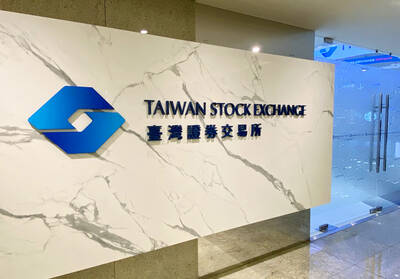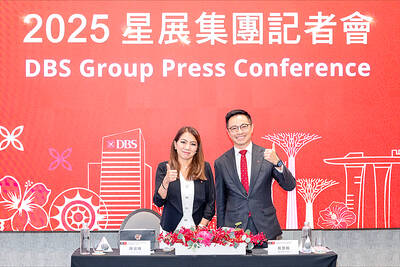Softbank Group Corp is in talks to sell the Paris-based robotics business behind its Pepper android to Germany’s United Robotics Group, according to sources and documents reviewed by Reuters, scaling back a business it once touted as a major growth driver.
The talks are ongoing and plans could change, said two sources familiar with the matter, who declined to be named as they are not permitted to speak to the media.
It is not clear whether Softbank would retain a stake in the business, nor how much the deal would be worth.

Photo: AFP
United Robotics Group, which is backed by German industrial robot maker Hahn, became the European master distributor for Softbank’s struggling Pepper and Nao robots this month.
United Robotics declined to comment. Softbank has said it remains committed to the Pepper business.
Reuters reported in June that Softbank had stopped production of Pepper and slashed jobs at its robotics business globally.
About half of 330 staff positions were cut in France, where operations date back to the 2012 acquisition of start-up Aldebaran, which custom-designed Pepper for Softbank.
LOW MORALE
Additional staff have quit because of low morale, forcing Softbank to advertise positions to fill core functions, according to the sources and a review of job postings.
United Robotics has offices in Germany and Austria. Recently departed Softbank staff in areas such as sales have been hired by the company, the sources said.
Softbank, which is riven by a culture divide between its European workforce and Japanese managers, has a dwindling stock of aging Pepper units and components approaching obsolescence, Reuters reported previously.
In addition to selling Pepper and Nao, a small humanoid robot, United Robotics also markets robots like Sawyer, an industrial robot that can operate alongside humans.
The restructuring comes as Softbank focuses on selling third-party hardware following the commercial failure of Pepper.
The conglomerate has created a parallel sales operation in Britain, reducing its reliance on the Paris-based business.
PLATO
Softbank engineers in France have been working on a secret project to design a serving robot called Plato, according to the sources and documents reviewed by Reuters.
However, managers in Japan have put off ordering the robot, the sources said.
At the same time, Softbank has struck deals to sell similar robots from outside firms, diminishing the commercial viability of its own product.

Taiwan Semiconductor Manufacturing Co (TSMC, 台積電) secured a record 70.2 percent share of the global foundry business in the second quarter, up from 67.6 percent the previous quarter, and continued widening its lead over second-placed Samsung Electronics Co, TrendForce Corp (集邦科技) said on Monday. TSMC posted US$30.24 billion in sales in the April-to-June period, up 18.5 percent from the previous quarter, driven by major smartphone customers entering their ramp-up cycle and robust demand for artificial intelligence chips, laptops and PCs, which boosted wafer shipments and average selling prices, TrendForce said in a report. Samsung’s sales also grew in the second quarter, up

LIMITED IMPACT: Investor confidence was likely sustained by its relatively small exposure to the Chinese market, as only less advanced chips are made in Nanjing Taiwan Semiconductor Manufacturing Co (TSMC, 台積電) saw its stock price close steady yesterday in a sign that the loss of the validated end user (VEU) status for its Nanjing, China, fab should have a mild impact on the world’s biggest contract chipmaker financially and technologically. Media reports about the waiver loss sent TSMC down 1.29 percent during the early trading session yesterday, but the stock soon regained strength and ended at NT$1,160, unchanged from Tuesday. Investors’ confidence in TSMC was likely built on its relatively small exposure to the Chinese market, as Chinese customers contributed about 9 percent to TSMC’s revenue last

Taiwan and Japan will kick off a series of cross border listings of exchange-traded funds (ETFs) this month, a milestone for the internationalization of the local ETF market, the Taiwan Stock Exchange (TWSE) said Wednesday. In a statement, the TWSE said the cross border ETF listings between Taiwan and Japan are expected to boost the local capital market’s visibility internationally and serve as a key for Taiwan becoming an asset management hub in the region. An ETF, a pooled investment security that is traded like an individual stock, can be tracked from the price of a single stock to a large and

Despite global geopolitical uncertainties and macroeconomic volatility, DBS Bank Taiwan (星展台灣) yesterday reported that its first-half revenue rose 10 percent year-on-year to a record NT$16.5 billion (US$537.8 million), while net profit surged 65 percent to an unprecedented NT$4.4 billion. The nation’s largest foreign bank made the announcement on the second anniversary of its integration with Citibank Taiwan Ltd’s (花旗台灣) consumer banking business. “Taiwan is a key market for DBS. Over the years, we have consistently demonstrated our commitment to deepening our presence in Taiwan, not only via continued investment to support franchise growth, but also through a series of bolt-on acquisitions,” DBS